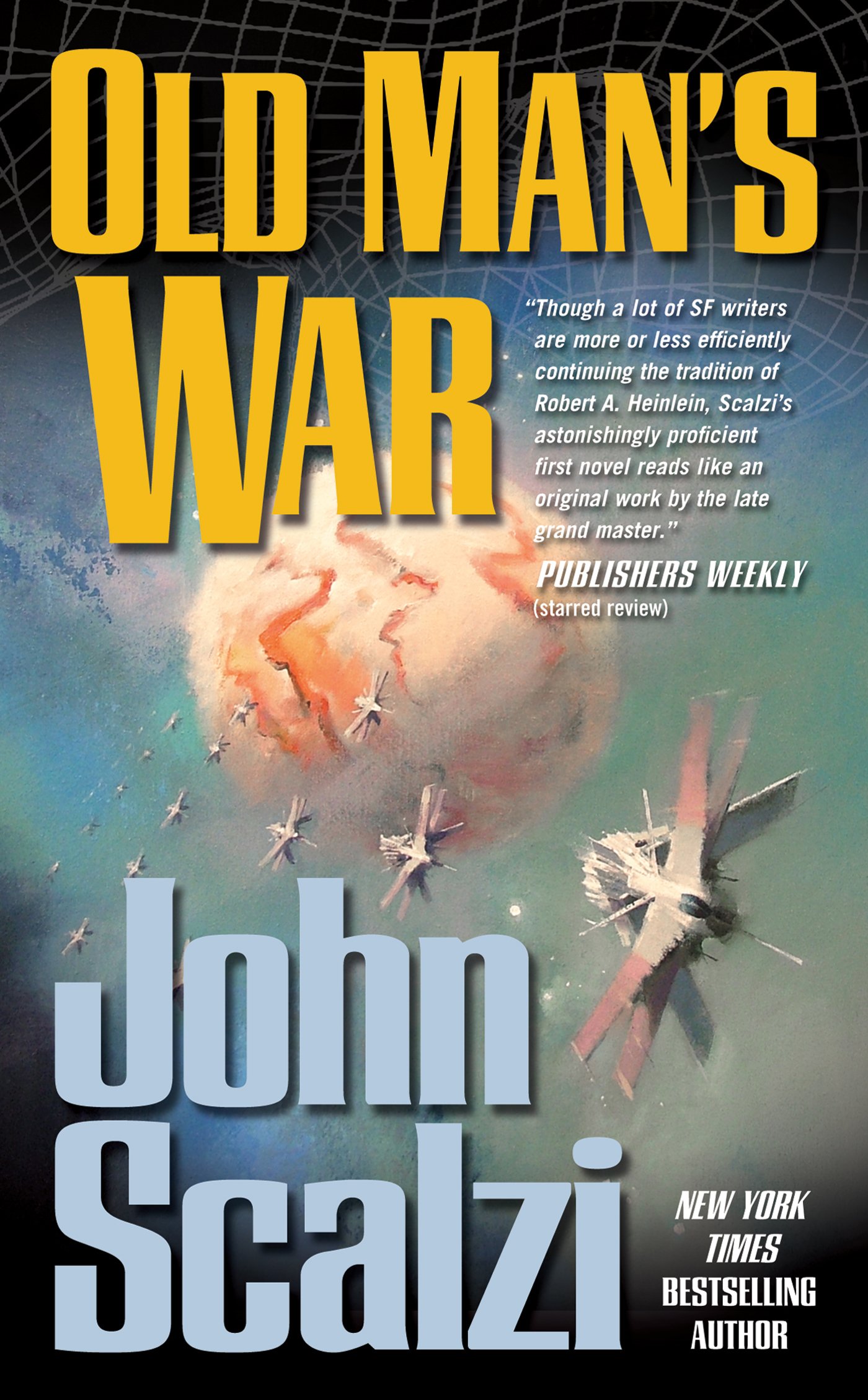Book review: “Old Man’s War”
 Another day, another book review. This one’s for my latest read, sci-fi author John Scalzi’s 2005 debut novel, Old Man’s War.
Another day, another book review. This one’s for my latest read, sci-fi author John Scalzi’s 2005 debut novel, Old Man’s War.
Old Man’s War is the kind of story Hollywood would refer to as “high-concept.” In this case, the concept is pretty succinctly summed up in the novel’s opening lines:
I did two things on my seventy-fifth birthday. I visited my wife’s grave. Then I joined the army.
The “I” in those lines is John Perry, an aging widower in the distant future who lives outside of Dayton, Ohio. (Scalzi is a Daytonian himself, and since I was born and raised there, I happily give him bonus points for that.) But the army Perry joins isn’t the U.S. Army; it’s the Colonial Defense Forces (CDF), a vast, shadowy organization that manages and protects the colonies humans have established out among the stars.
Its contacts with alien civilizations have given the CDF access to incredible technology — technology far beyond anything people living on Earth have access to. So it’s in a position to offer graying Terrans a hard-to-argue-with deal: sign up for a ten-year stint in the Colonial army, and the CDF will use all that technology to restore your youth. It’s a chance to live life all over again, only this time knowing all the hard lessons you learned the first time around. You’ll have to fight, of course; there’s a reason the CDF needs a constant stream of new recruits. And exactly how the CDF gives you your youth back is a closely guarded secret. But it’s a chance to roll the clock back. And who knows, you might even survive the entire ten years!
Perry, like lots of others, thinks that sounds like a pretty good bargain. So he joins up, and we follow him through his training and his CDF service, discovering along the way the secrets behind the CDF’s Fountain of Youth and the questionable morality that underlies the CDF’s policies.
Old Man’s War is, at heart, a modern example of an old slice of the genre: military sci-fi. Reviewers compare it frequently to the works of Robert A. Heinlein, which makes sense, since it rolls smoothly down a groove that was dug out long ago by Heinlein’s Starship Troopers, exploring many of the same themes and topics: the relationship between the citizen and the military, the morality of war, and so forth.
But even putting aside the thematic similarities, I can see why people make the comparison to Heinlein, because like Heinlein, Scalzi is a damn fine writer. His prose is vigorous and compulsively readable; I didn’t read Old Man’s War so much as I inhaled it, gulping down the entire book in just a couple of sittings. The action is compelling and kinetic, which is important in an adventure story. And while John Perry isn’t a particularly complicated character, Scalzi gives him enough color and nuance to avoid him seeming like a cardboard cut-out or authorial Mary Sue. So there’s a lot to like about Old Man’s War.
In fact, the only thing that really disappointed me about it was that Scalzi’s reach occasionally exceeds his grasp. For the most part, these failures are small ones. Scalzi is the kind of sci-fi writer who takes the “sci” part seriously, for example, which is fine as far as it goes; there’s plenty of room in the genre for both “hard” and “soft” science fiction. But in Old Man’s War this tendency manifests itself in a character whose job is to periodically stop the story to explain the science of what we’re seeing to us, and to me that’s a no-no. Any time the science in a science fiction story gets so enamored of itself that it starts elbowing the fiction aside, it gets on my nerves; the story should always come first. But these interludes are few and short, so they never send the book completely off the rails.
There is one place, however, where this reach-exceeds-grasp problem is significant, and it boils down to this: you can’t make a 21st-century version of Starship Troopers without grappling with the things that make Starship Troopers uncomfortable to read in the 21st century. Heinlein was a great writer, but his politics could be (to put it mildly) problematic, and in Starship Troopers he frankly sees violence was a sort of purifying, ennobling force that makes those who deal in it superior to those who do not. That’s not necessarily fascism, but it sure isn’t democracy either.
If you’re going to tell a story that hearkens back to Troopers, then, you have to make a choice: either embrace all that paleoconservative baggage, or challenge it. But in Old Man’s War, Scalzi never really commits to either approach. Sometimes he makes gestures toward a critique of the default military sci-fi ideology. We sometimes see how endless war grinds Perry down, for instance, and the battle scenes never tip over the edge into glorification. But there’s plenty of the old-time religion in there as well, alas; Perry turns out to be really good at war, he gets over his occasional bouts of conscience with depressing ease, and the only character who explicitly challenges the rightness of expansion at gunpoint is written as a buffoon whose naïvete puts the lives of his squadmates at risk.
None of which is to say that I didn’t enjoy Old Man’s War; I did, quite a bit. But all that enjoyment made me wish the book had just pushed itself a little further, a little harder, to become something a little greater than just a fun read.
Want more? Links to all Summer of Fiction book reviews can be found here.
